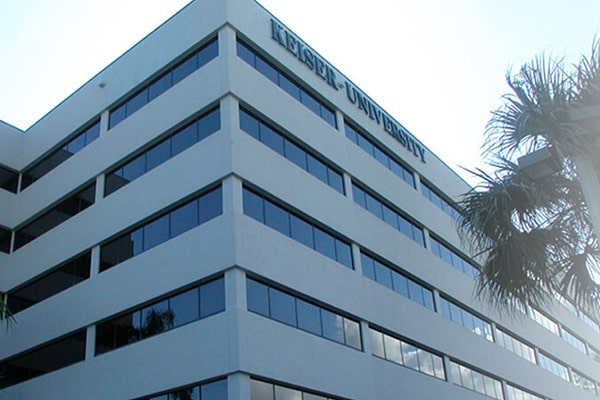Respiratory Therapy, AS
Keiser University’s Associate of Science degree in Respiratory Therapy prepares students for employment as respiratory therapists under the supervision of licensed physicians. A Respiratory Therapist provides education, diagnostic testing and respiratory therapy in the management of conditions such as chronic obstructive pulmonary disease, acute cardio-respiratory failure, asthma, and other pulmonary pathologies.
Responsibilities of a respiratory therapist include:
- Identifying lung and breathing disorders and recommending treatment methods;
- Interviewing patients and doing chest physical exams to determine what kind of therapy is best for their condition;
- Consulting with physicians to recommend a change in therapy, based on patient evaluation;
- Analyzing breath, tissue, and blood specimens to determine levels of oxygen and other gases;
- Managing ventilators and artificial airway devices for patients who can’t breathe normally on their own;
- Responding to Code Blue or other urgent calls for care;
- Educating patients and families about lung disease so they can maximize their recovery.
Successful completion of the program qualifies graduates to receive an Associate of Science degree, and become eligible to sit for the national accreditation exams for the designation of the Registered Respiratory Therapist (RRT) and apply for state license as a respiratory therapist. The national examinations consist of the Therapist Multiple-Choice Examination (TCM) and the Clinical Simulation Examination(CSE) offered by the National Board of Respiratory Care (NBRC).
Information on the exam process is available through the NBRC at www.nbrc.org.
Program Objectives
The following objectives are designed to meet Keiser University’s Respiratory Therapy Program’s mission and goals:
- To provide an environment in which students demonstrate ethical behaviors, critical thinking skills and a commitment to lifelong learning;
- Development of clinical skills, treatment techniques, understanding of methodology, and rationale for implementation and interpretation of diagnostics and cardio-respiratory care;
- To provide the students with an academic foundation to adequately fulfill the role of a respiratory care practitioner in a clinical setting.
Program Goals
- To prepare graduates with demonstrated competence in cognitive (knowledge), psychomotor (skills), and affective (behavior) learning domains of respiratory care practice as performed by registered respiratory therapists (RRT’s).
Annual Programmatic Outcomes Data:
Published by the Commission on Accreditation for Respiratory Care
Outcomes data from the Annual Report of Current Status has been posted on the CoARC website. Follow this link directly https://coarc.com/students/programmatic-outcomes-data/. CoARC accredits respiratory therapy education programs in the United States. To achieve this end, it utilizes an ‘outcomes based’ process. Programmatic outcomes are performance indicators that reflect the extent to which the educational goals of the program are achieved and by which program effectiveness is documented.
Program Mission
The Respiratory Therapy program at Keiser University offers an associate of science degree that is designed to prepare students to become effective, knowledgeable, safe and competent respiratory therapy practitioners who will practice under the supervision and direction of a licensed physician.
Program Philosophy
Respiratory Therapy is a profession that serves a diverse population. The respiratory therapy practitioner plays an integral role in the delivery of respiratory therapy services under the direction and supervision of a licensed physician.
The Respiratory Therapy curriculum integrates didactic, laboratory and clinical practicums, each of which plays a significant role in the education of the student.
The program:
- Recognizes that communication and interaction skills play an integral role in the preparation of a student to become an advanced practitioner respiratory therapist
- Recognizes that each student is an individual participant who brings a variety of needs and attributes to the educational process
- Promotes diverse educational methodologies to create a rich learning environment for all students
- Encourages both the faculty and the student to take responsibility for the learning environment, which requires cooperation and commitment from all individuals involved in the program
- Recognizes that learning and assessment is a continuous process that is a necessary component of professional growth and development
Prerequisites for Major Courses
- Background check and drug screening;
- Completion of prerequisites BSC2085C and BSC2086C, Human Anatomy and Physiology I and II with a minimum of a “B” in each course;
- Completion of the following prerequisite courses: MCB2000C and CHEM2045/L and all general education coursework with a minimum grade of “C” for each course;
- Cumulative grade average of 3.0 on a scale of 4.0.
Program Outline
To receive an Associate of Science degree in Respiratory Therapy, students must earn 76.0 credit hours. Each course in the Respiratory Therapy major is a prerequisite for the subsequent course and must be completed with a grade of “C” or higher in order to progress to the next course in the sequence. Students must complete all courses in the program core.
Requirements are as follows:
Lower Division Courses
| Respiratory Therapy Major Courses (42.0 credit hours total) | |
|---|---|
| Respiratory Therapy Fundamentals | 3.0 credit hours |
| Respiratory Therapy Theory | 3.0 credit hours |
| Clinical Respiratory Medicine | 3.0 credit hours |
| Pharmacology for Respiratory Care | 3.0 credit hours |
| Clinical Practicum I | 3.0 credit hours |
| Diagnostic Procedures in Respiratory Care | 3.0 credit hours |
| Intensive Respiratory Care | 3.0 credit hours |
| Clinical Practicum II | 3.0 credit hours |
| Pediatric and Neonatal Respiratory Therapy | 3.0 credit hours |
| Clinical Practicum III | 3.0 credit hours |
| Special Topics in Respiratory Therapy | 3.0 credit hours |
| Clinical Practicum IV | 3.0 credit hours |
| Clinical Practicum V | 3.0 credit hours |
| Respiratory Therapy Management | 3.0 credit hours |
| Behavioral Science (3.0 credit hours) | |
|---|---|
| Introduction to Psychology | 3.0 credit hours |
| Communications (3.0 credit hours) | |
|---|---|
| Speech Communications | 3.0 credit hours |
| Computers (3.0 credit hours) | |
|---|---|
| Introduction to Computers | 3.0 credit hours |
| English (3.0 Credit Hours) | |
|---|---|
| English Composition I | 3.0 credit hours |
| Humanities/Fine Arts (3.0 credit hours) | |
|---|---|
| American Literature | 3.0 credit hours |
| English Literature | 3.0 credit hours |
| Mathematics (3.0 credit hours) | |
|---|---|
| College Algebra | 3.0 credit hours |
| Natural Science (16.0 credit hours) | |
|---|---|
| Human Anatomy and Physiology I | 4.0 credit hours |
| Human Anatomy and Physiology II | 4.0 credit hours |
| Microbiology I | 4.0 credit hours |
| General Chemistry | 3.0 credit hours |
| General Chemistry Laboratory | 1.0 credit hour |
* An Associate of Science Degree is considered a terminal degree and is not transferable.
State Licensure Disclosure
Faculty Directory
Medical Director
Dr. Jeffrey Wolkowicz MD
jeffrey.wolkowicz@keiseruniversity.edu
Program Director
Fitzwilliam Thompson, BHS, BA, RRT
fithompson@keiseruniversity.edu
Director of Clinical Education
Bruce Hibber MPH, RRT
bruce.hibbert@keiseruniversity.edu
Faculty
Lloni-Rae Crooks, BS, RRT
llonirae.crooks@keiseruniversity.edu
Eliana Moreira, B.A., M.A., RRT
eliana.moreira@keiseruniversity.edu
Estimated Student Costs
| Estimated Average Expenses for the Respiratory Therapy Program | |
|---|---|
| Tuition | $11,468.00 per semester |
| Education Fee | $980.00 per semester |
| Books | $800.00 per semester |
| Health Insurance | Market Value |
| Other Fees | |
|---|---|
| Registration Fee | $ 145.00 non-refundable |
| Application Fee | $ 55.00 non refundable |
| Withdrawal Fee | $ 100.00 |
| Re-Entry Fee | $ 150.00 |
| Transcript Fee | $ 5.00 |
| One-Time Expense | |
|---|---|
| Clinical Compliance Tracking | $ 266.00 |
| BLS, ACLS, PALS, NRP | Market Value |
| Medical Expenses/Screenings | $ 293.00 |
| Uniforms/Lab Coat/Stethoscope | $ 200.00 |
| Self-Assessment Exam: Therapist Multiple Choice | $ 50.00 |
| Self-Assessment Exam: Clinical Simulations for RRT | $ 70.00 |
| Boards and State Licensure Fees | |
|---|---|
| National Board of Respiratory Care: Therapist Multiple Choice Exam | $ 190.00 |
| National Board of Respiratory Care: Clinical Simulations Exam | $ 200.00 |
* Refer to undergraduate student catalog for specific tuition and program fees.
Equal Opportunity
Keiser University’s policy of equal opportunity, consistent with Federal policy, is that no person shall, on the grounds of race, creed, color, handicap, national origin, sex, age, political affiliation, sexual orientation, marital status or belief, be excluded from any training, be denied the benefit of training or be subjected to discrimination in any hiring practice or activity of the University. To ensure continued success in achieving equal opportunity and non-discrimination in all of its programs and departments, Keiser University hereby reaffirms that it is the responsibility of all staff administration and supervisory personnel to work actively to ensure equal opportunities within their respective departments, as well as to demonstrate a personal and professional commitment to equal opportunity for all persons. Management and supervisory personnel have a responsibility to provide leadership and support for equal opportunity programs.
The program, #200571, is accredited by the Commission on Accreditation for Respiratory Care.








